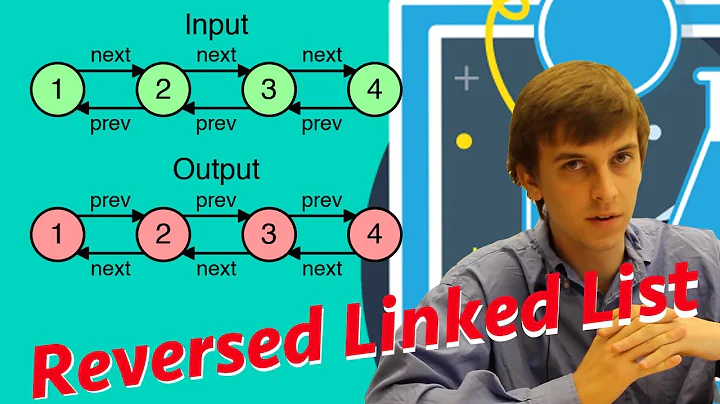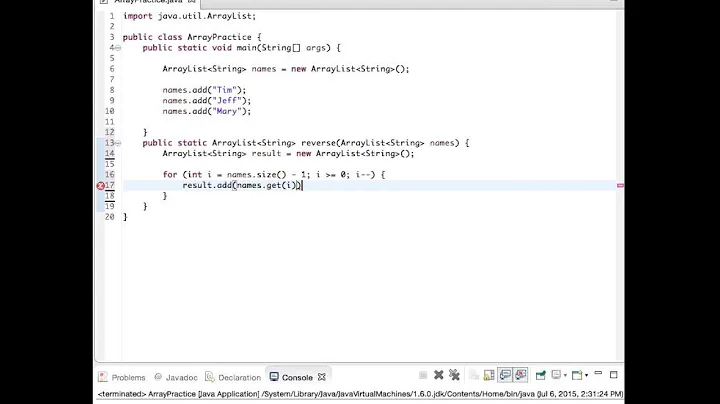How to get a reversed list view on a list in Java?
Solution 1
Guava provides this: Lists.reverse(List)
List<String> letters = ImmutableList.of("a", "b", "c");
List<String> reverseView = Lists.reverse(letters);
System.out.println(reverseView); // [c, b, a]
Unlike Collections.reverse, this is purely a view... it doesn't alter the ordering of elements in the original list. Additionally, with an original list that is modifiable, changes to both the original list and the view are reflected in the other.
Solution 2
Use the .clone() method on your List. It will return a shallow copy, meaning that it will contain pointers to the same objects, so you won't have to copy the list. Then just use Collections.
Ergo,
Collections.reverse(list.clone());
If you are using a List and don't have access to clone() you can use subList():
List<?> shallowCopy = list.subList(0, list.size());
Collections.reverse(shallowCopy);
Solution 3
If i have understood correct then it is one line of code .It worked for me .
Collections.reverse(yourList);
Solution 4
Its not exactly elegant, but if you use List.listIterator(int index) you can get a bi-directional ListIterator to the end of the list:
//Assume List<String> foo;
ListIterator li = foo.listIterator(foo.size());
while (li.hasPrevious()) {
String curr = li.previous();
}
Solution 5
I use this:
public class ReversedView<E> extends AbstractList<E>{
public static <E> List<E> of(List<E> list) {
return new ReversedView<>(list);
}
private final List<E> backingList;
private ReversedView(List<E> backingList){
this.backingList = backingList;
}
@Override
public E get(int i) {
return backingList.get(backingList.size()-i-1);
}
@Override
public int size() {
return backingList.size();
}
}
like this:
ReversedView.of(backingList) // is a fully-fledged generic (but read-only) list
Related videos on Youtube
Albert
I am postgraduate of RWTH Aachen, Germany and received a M.S. Math and a M.S. CompSci. My main interests are Machine Learning, Neural Networks, Artificial Intelligence, Logic, Automata Theory and Programming Languages. And I'm an enthusiastic hobby programmer with a wide range of side projects, mostly in C++ and Python. Homepage GitHub SourceForge HackerNewsers profile page MetaOptimize Q+A
Updated on March 18, 2022Comments
-
Albert about 2 years
I want to have a reversed list view on a list (in a similar way than
List#sublistprovides a sublist view on a list). Is there some function which provides this functionality?I don't want to make any sort of copy of the list nor modify the list.
It would be enough if I could get at least a reverse iterator on a list in this case though.
Also, I know how to implement this myself. I'm just asking if Java already provides something like this.
Demo implementation:
static <T> Iterable<T> iterableReverseList(final List<T> l) { return new Iterable<T>() { public Iterator<T> iterator() { return new Iterator<T>() { ListIterator<T> listIter = l.listIterator(l.size()); public boolean hasNext() { return listIter.hasPrevious(); } public T next() { return listIter.previous(); } public void remove() { listIter.remove(); } }; } }; }
I just have found out that some
Listimplementations havedescendingIterator()which is what I need. Though there is no general such implementation forList. Which is kind of strange because the implementation I have seen inLinkedListis general enough to work with anyList.-
Tony Ennis over 13 yearsCan you build the list in the reverse order to begin with?
-
 TofuBeer over 13 yearsYes it does - java.uitl.List.listIterator(int) download.oracle.com/javase/6/docs/api/java/util/…
TofuBeer over 13 yearsYes it does - java.uitl.List.listIterator(int) download.oracle.com/javase/6/docs/api/java/util/… -
 ZhaoGang over 5 yearsIf you visit this link to find the answer how to reverse(modify) the list, this is the answer:
ZhaoGang over 5 yearsIf you visit this link to find the answer how to reverse(modify) the list, this is the answer:Collections.reverse(list)
-
-
Albert over 13 years
clone()normally would create a copy of the list. Anyway,List#clone()also does not exist. -
jcalvert over 13 yearsYou are technically right, the List interface itself doesn't provide the clone() method. But ArrayList, LinkedList and Vector all do.
-
jcalvert over 13 yearsClone is a shallow copy of the list. It will not copy the members. But I think I understand where you're going with this now, in reference to a "view", as any structural change to the 'view' from subList() alters the original as well. I don't think you have any way to do what you want without creating a class as you did in your demo.
-
Albert over 13 yearsI just looked up the implementation of
clone(). It indeed does a full copy of the list (it only does not clone each single object in the list but that was never what I was talking about). -
 Dmitry Zaytsev about 12 yearsYour code have a one problem - you can put any List to it, but it'll always return you ArrayList (as List). And what if I need LinkedList? It's better to modify myList, and return void.
Dmitry Zaytsev about 12 yearsYour code have a one problem - you can put any List to it, but it'll always return you ArrayList (as List). And what if I need LinkedList? It's better to modify myList, and return void. -
Albert about 12 yearsNote that this is not really what I was asking for. I was asking for some sort of proxy/view, not a copy.
-
Albert over 11 yearsThat is not a list view. A view is the opposite of a copy.
-
Albert over 10 yearsThat is not a list view. That modifies the list.
-
user12722 about 9 yearsNote that Collections.reverse returns void, so you would lose the clone reference. You need to assign the clone to a variable first, then sort it.
-
Filipe Brito almost 9 yearsThe problem is that Guava is a very large library. See the discussion: github.com/google/guava/issues/1954 and code.google.com/p/guava-libraries/issues/detail?id=605
-
ColinD almost 9 years@Filipe de Lima Brito: ProGuard is still the best solution for library size, though there are likely improvements we can make. In any case, I don't think library size is relevant in any way to this answer.
-
Filipe Brito almost 9 yearsYes, the library size isn’t relevant to this answer, but is relevant to be informed for the programmers (therefore, I commented)! Thank you very much for this great library and for your suggestion @ColinD!
-
AaA almost 8 years@ColinD, yup, it was my mistake. A colleague added google-collections which also have same namespace and class (
List) but without reverse method. removing it made guava available again. -
 ShellFish almost 7 yearsThe reverse list of an empty list is null??
ShellFish almost 7 yearsThe reverse list of an empty list is null?? -
 djangofan almost 7 yearsIf you didn't want to use built-in descndingIterator() method, it seems like using a ConcurrentLinkedDeque would be the best to reverse a very large list? Basically just copy from one deck to the new deck using poll then offer ? Sorta like just having a deck of cards and taking each off the top into a new pile, in order.
djangofan almost 7 yearsIf you didn't want to use built-in descndingIterator() method, it seems like using a ConcurrentLinkedDeque would be the best to reverse a very large list? Basically just copy from one deck to the new deck using poll then offer ? Sorta like just having a deck of cards and taking each off the top into a new pile, in order. -
Roland almost 7 years
subListdoesn't copy, it just provides a view on the underlying list, therefore reversing this view will reverse the underlying list. -
 Jonathan Benn over 5 yearsThis is the best answer, since (1) it does not require a library, and (2) it does not modify the original list, as the OP requested
Jonathan Benn over 5 yearsThis is the best answer, since (1) it does not require a library, and (2) it does not modify the original list, as the OP requested -
 Jonathan Benn over 5 yearsYou're just repeating the answer someone else wrote 6 years ago
Jonathan Benn over 5 yearsYou're just repeating the answer someone else wrote 6 years ago -
 Jonathan Benn over 5 yearsDevelopers don't always have control over what libraries they can use, and adding a whole new library for something so simple seems like overkill--especially given that the problem can be solved with
Jonathan Benn over 5 yearsDevelopers don't always have control over what libraries they can use, and adding a whole new library for something so simple seems like overkill--especially given that the problem can be solved withListIterator.previous() -
Jason S over 4 years...and not a view. this mutates the list.
-
 Olivier Grégoire about 4 years@JonathanBenn the problem is that the problem is not so simple. You have so many implementations of
Olivier Grégoire about 4 years@JonathanBenn the problem is that the problem is not so simple. You have so many implementations ofListthat reversing it appropriately entirely depends on the context (do you use a List for its index, do you use it for the ordered property, etc.) This answer is the best at mixing all those. -
Brain almost 4 yearsAgree, the response of jcalvert is way better, because it uses the standard library. Guava just cause problems with other frameworks. You can say "it pollutes" your code.
-
Florent over 2 yearsArrayList.clone returns Object which is not accepted by Collections.reverse()









